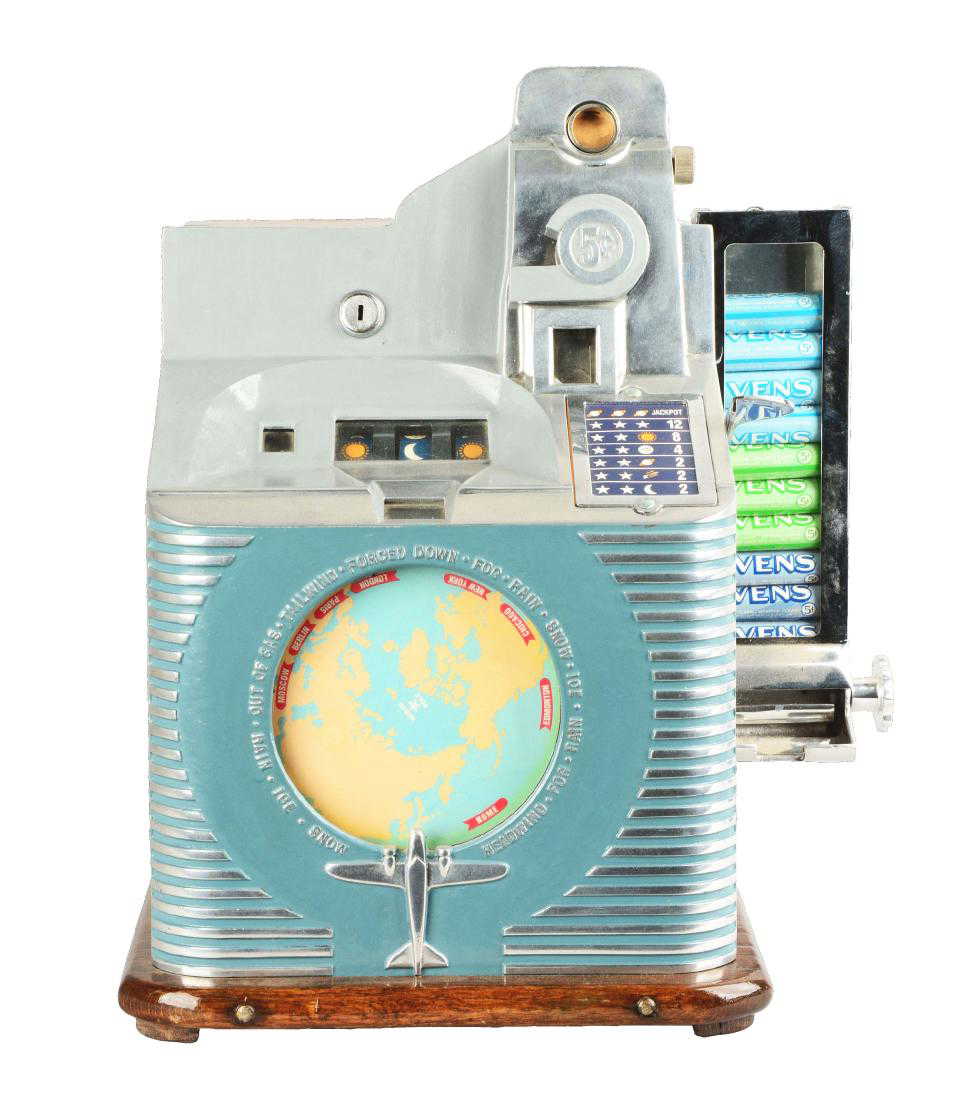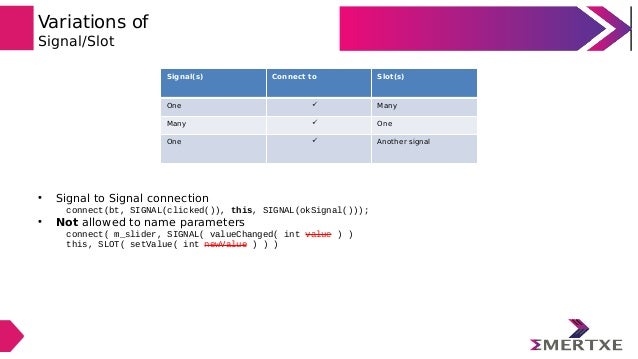Qt Slot Mapper
- Qt Slot Mapper Software
- Qt Signal Slot Mapper
- Qt Slot Mapper Tool
- Qt Slot Mapper Download
- Qt Slot Mapper Games
QDataWidgetMapper. mapper = new QDataWidgetMapper ; mapper- setModel(myModel); mapper- addMapping(nameLineEdit, 0); mapper- addMapping(ageSpinBox, 1); Notes: If the widget is already mapped to a section, the old mapping will be replaced by the new one. Only one-to-one mappings between sections and widgets are allowed. The mapper's currentIndexChanged signal is connected to the updateButtons slot in the window which we'll show later. In the final part of the constructor, we set up the layout, placing each of the widgets in a grid (we could also use a QFormLayout for this). I have been trying to implement signal mapper. I have used the example code below. But, this example code from 4.8 doesn't have SLOT getting signal from 'mapped'. So, I added my own SLOT(doThings(int)). But signal mapper doesn't send any signal to the slot. Any help would be really appreciated.
The QSignalMapper class bundles signals from identifiable senders. More...
| Header: | #include <QSignalMapper> |
| qmake: | QT += core |
| Inherits: | QObject |
This class is obsolete. It is provided to keep old source code working. We strongly advise against using it in new code.
Qt Slot Mapper Software
Public Functions
(deprecated) | QSignalMapper(QObject *parent = nullptr) |
| ~QSignalMapper() | |
| QObject * | mapping(int id) const |
| QObject * | mapping(const QString &id) const |
| QObject * | mapping(QWidget *widget) const |
| QObject * | mapping(QObject *object) const |
| void | removeMappings(QObject *sender) |
| void | setMapping(QObject *sender, int id) |
| void | setMapping(QObject *sender, const QString &text) |
| void | setMapping(QObject *sender, QWidget *widget) |
| void | setMapping(QObject *sender, QObject *object) |
- 32 public functions inherited from QObject
Public Slots
- 1 public slot inherited from QObject
Signals
| void | mapped(int i) |
| void | mapped(const QString &text) |
| void | mapped(QWidget *widget) |
| void | mapped(QObject *object) |
- 2 signals inherited from QObject
Additional Inherited Members
- 1 property inherited from QObject
- 11 static public members inherited from QObject
- 9 protected functions inherited from QObject
Detailed Description
The QSignalMapper class bundles signals from identifiable senders.
This class collects a set of parameterless signals, and re-emits them with integer, string or widget parameters corresponding to the object that sent the signal.
The class supports the mapping of particular strings or integers with particular objects using setMapping(). The objects' signals can then be connected to the map() slot which will emit the mapped() signal with the string or integer associated with the original signalling object. Mappings can be removed later using removeMappings().
Example: Suppose we want to create a custom widget that contains a group of buttons (like a tool palette). One approach is to connect each button's clicked() signal to its own custom slot; but in this example we want to connect all the buttons to a single slot and parameterize the slot by the button that was clicked.
Here's the definition of a simple custom widget that has a single signal, clicked(), which is emitted with the text of the button that was clicked:
The only function that we need to implement is the constructor:
A list of texts is passed to the constructor. A signal mapper is constructed and for each text in the list a QPushButton is created. We connect each button's clicked() signal to the signal mapper's map() slot, and create a mapping in the signal mapper from each button to the button's text. Finally we connect the signal mapper's mapped() signal to the custom widget's clicked() signal. When the user clicks a button, the custom widget will emit a single clicked() signal whose argument is the text of the button the user clicked.
This class was mostly useful before lambda functions could be used as slots. The example above can be rewritten simpler without QSignalMapper by connecting to a lambda function.
See also QObject, QButtonGroup, and QActionGroup.
Member Function Documentation
QSignalMapper::QSignalMapper(QObject *parent = nullptr)
This function is deprecated.
Constructs a QSignalMapper with parent parent.
QSignalMapper::~QSignalMapper()
Destroys the QSignalMapper.
[slot] void QSignalMapper::map()
This slot emits signals based on which object sends signals to it.
[slot] void QSignalMapper::map(QObject *sender)
This slot emits signals based on the sender object.
[signal] void QSignalMapper::mapped(inti)
This signal is emitted when map() is signalled from an object that has an integer mapping set. The object's mapped integer is passed in i.

Note: Signal mapped is overloaded in this class. To connect to this signal by using the function pointer syntax, Qt provides a convenient helper for obtaining the function pointer as shown in this example:
See also setMapping().
[signal] void QSignalMapper::mapped(const QString &text)
This signal is emitted when map() is signalled from an object that has a string mapping set. The object's mapped string is passed in text.
Note: Signal mapped is overloaded in this class. To connect to this signal by using the function pointer syntax, Qt provides a convenient helper for obtaining the function pointer as shown in this example:
See also setMapping().
Qt Signal Slot Mapper

[signal] void QSignalMapper::mapped(QWidget *widget)
This signal is emitted when map() is signalled from an object that has a widget mapping set. The object's mapped widget is passed in widget.
Note: Signal mapped is overloaded in this class. To connect to this signal by using the function pointer syntax, Qt provides a convenient helper for obtaining the function pointer as shown in this example:
See also setMapping().
[signal] void QSignalMapper::mapped(QObject *object)
This signal is emitted when map() is signalled from an object that has an object mapping set. The object provided by the map is passed in object.
Note: Signal mapped is overloaded in this class. To connect to this signal by using the function pointer syntax, Qt provides a convenient helper for obtaining the function pointer as shown in this example:
See also setMapping().
QObject *QSignalMapper::mapping(intid) const
Returns the sender QObject that is associated with the id.
See also setMapping().
QObject *QSignalMapper::mapping(const QString &id) const
This function overloads mapping().
QObject *QSignalMapper::mapping(QWidget *widget) const
This function overloads mapping().
Returns the sender QObject that is associated with the widget.
QObject *QSignalMapper::mapping(QObject *object) const
This function overloads mapping().
Returns the sender QObject that is associated with the object.
void QSignalMapper::removeMappings(QObject *sender)
Removes all mappings for sender.
This is done automatically when mapped objects are destroyed.

Note: This does not disconnect any signals. If sender is not destroyed then this will need to be done explicitly if required.
void QSignalMapper::setMapping(QObject *sender, intid)
Adds a mapping so that when map() is signalled from the given sender, the signal mapped(id) is emitted.
There may be at most one integer ID for each sender.
See also mapping().
void QSignalMapper::setMapping(QObject *sender, const QString &text)
Adds a mapping so that when map() is signalled from the sender, the signal mapped(text ) is emitted.
There may be at most one text for each sender.
void QSignalMapper::setMapping(QObject *sender, QWidget *widget)
Adds a mapping so that when map() is signalled from the sender, the signal mapped(widget ) is emitted.
There may be at most one widget for each sender.
Qt Slot Mapper Tool
void QSignalMapper::setMapping(QObject *sender, QObject *object)
Qt Slot Mapper Download
Adds a mapping so that when map() is signalled from the sender, the signal mapped(object ) is emitted.
Qt Slot Mapper Games
There may be at most one object for each sender.
© 2020 The Qt Company Ltd. Documentation contributions included herein are the copyrights of their respective owners. The documentation provided herein is licensed under the terms of the GNU Free Documentation License version 1.3 as published by the Free Software Foundation. Qt and respective logos are trademarks of The Qt Company Ltd. in Finland and/or other countries worldwide. All other trademarks are property of their respective owners.